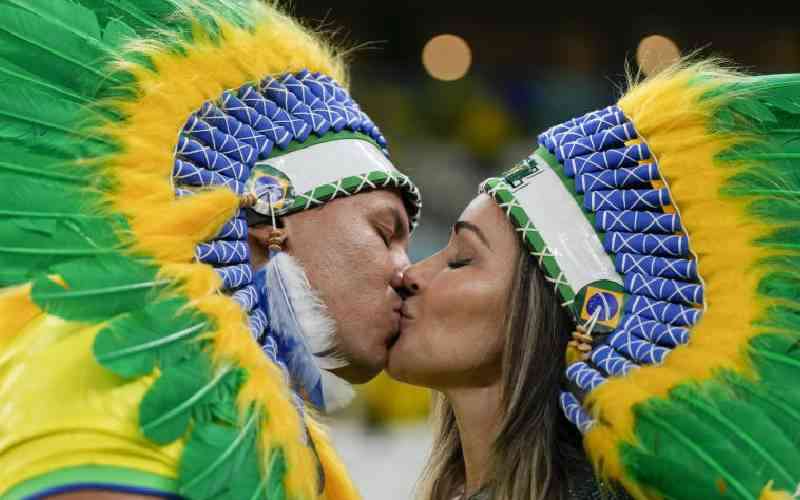
The just concluded 2022 FIFA world cup in Qatar presented humanity with fresh awe; the way of the sainted feet on the pitch with the likes of Argentina's Lionel Messi and France's Kylian Mbappe, the finesse and flair of word mastery from the likes of Peter Drury's commentary and the avantgarde tact of shaping foreign policy on and off the pitch by world leaders.
It was no wonder "the best world cup ever" as FIFA president Gianni Infantino unequivocally averred. Most heads of States seized the opportunity in Qatar to shape one or all of the three dimensions of global affairs: diplomacy, international relations and soft power.
The Turkish President Recep Tayyip Erdogan, ensured he attended both the opening and closing ceremonies to stamp his support for Qatar's strategic national branding. US Secretary of State Antony J. Blinken cheered the United States versus Wales, preceded by policy talks with Qatari officials the night before.
France's President Emmanuel Macron arrived to back his national team "les Bleus" against Morocco for a place in the World Cup finals, met with Qatari officials in Doha and promised further engagement on a return visit during the final play-offs.
Britain's foreign minister James Cleverly took time off the football frenzy to hold "difficult conversations" with Qatari officials about human rights. African leaders too rushed to take up their place in football glory, featuring among others: President William Ruto of the Republic of Kenya, President of the Republic of Rwanda Paul Kagame, President of the Republic of Senegal Macky Sall and President of the Republic of Liberia George Weah.
Qatar arguably emerged a hero in diplomatic tact out of the 2022 World Cup. This small, affluent kingdom in the Persian Gulf, had a thoughtful national branding plan to raise her standing within community of States. Qatar launched National Vision 2030 in 2018 to leverage the strategic importance of sports in strengthening her national brand and diplomatic relations.
Consequently, the Gulf nation vowed to hold a wunderkind World Cup. Its success has strategically created a counternarrative to persistent criticisms of abuses and deaths of thousands of migrant workers who mostly constructed stadiums.
In 2021, The Guardian reported that at least 6,500 had died. The number could be higher as it does not include deaths from other countries that send large numbers of workers to Qatar, including Kenya and Philippines.
Qatar has also faced sharp bribery criticism. In April 2020, the US department of Justice revealed that representatives working for Russia and Qatar had bribed FIFA officials to secure hosting rights for the World Cup. To fathom the height of Qatar's national brand success against the human cost of 2022 World Cup, one needs to mull over her controversial official response over the death of a Filipino migrant worker said to have fallen off a World Cup construction site and how quickly it drowned.
"Death is a natural part of life, whether it's at work, whether it's in your sleep." Qatar's World Cup's chief executive, Nasser al-Khater, responded to a journalist. The world might not necessarily remember these remarks, but they will forever remember the image of Messi being dressed in the traditional Arab cloak by Sheikh Tamim bin Hamad Al Thani, the Emir of Qatar, beside the World Cup trophy at the closing ceremony.
African leaders had an unrivalled opportunity to push for difficult conversations regarding migrant workers' abuse and deaths. It appears to have been tricky for them to balance diplomatic tact with the joy of the pitch, the wonder of the game and the sight of marveling stadiums.
While President Weah said he secured more funding for a highway project at a sidelines bilateral meeting with the emir of Qatar, Sheikh Tamim bin Hamad al-Thani, Liberians were least amused by his long stay in Doha, questioning his priorities. The plight of African migrant workers in the Persian Gulf remains an urgent humanitarian crisis. In September this year, the Economist reported that 87, 000 Ugandans arrived in the Middle East in 2021 under the government's "labour externalisation" programme and about a similar number of Kenyans.
Disturbingly, the Global Fund to End Modern Slavery (a pressure group) survey found that 99 per cent of Kenyan migrant workers in the Gulf are abused. The abuse included withholding of wages, confiscation of passports, violence and rape. In 2021 alone, 89 Kenyans died while working in Middle East, with some suspected to have been killed by their bosses. Diplomats worth their salt would surely leverage the unity yielded by the World Cup in Qatar to push for a diplomatic solution. Leaders from Africa wasted this chance - terribly.
The writer is a Foreign Affairs Analyst & a Communications Strategist
 The Standard Group Plc is a multi-media organization with investments in media platforms spanning newspaper print
operations, television, radio broadcasting, digital and online services. The Standard Group is recognized as a
leading multi-media house in Kenya with a key influence in matters of national and international interest.
The Standard Group Plc is a multi-media organization with investments in media platforms spanning newspaper print
operations, television, radio broadcasting, digital and online services. The Standard Group is recognized as a
leading multi-media house in Kenya with a key influence in matters of national and international interest.

